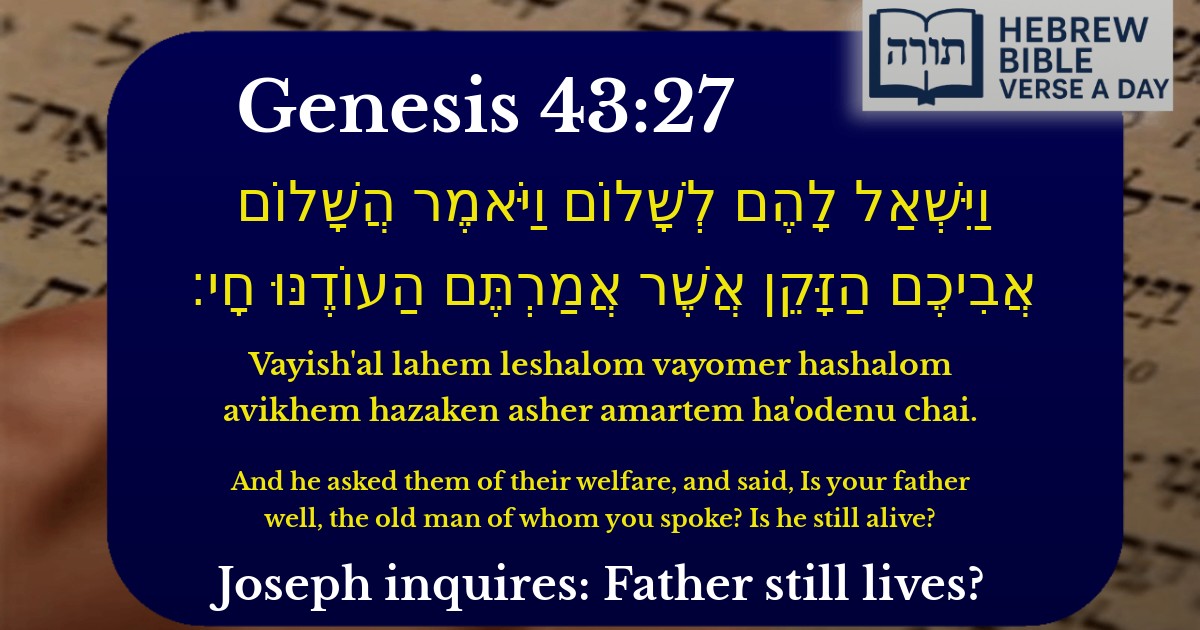Join Our Newsletter To Be Informed When New Videos Are Posted
Join the thousands of fellow Studends who rely on our videos to learn how to read the bible in Hebrew for free!
Hebrew Text
וַיִּשְׁאַל לָהֶם לְשָׁלוֹם וַיֹּאמֶר הֲשָׁלוֹם אֲבִיכֶם הַזָּקֵן אֲשֶׁר אֲמַרְתֶּם הַעוֹדֶנּוּ חָי׃
English Translation
And he asked them of their welfare, and said, Is your father well, the old man of whom you spoke? Is he still alive?
Transliteration
Vayish'al lahem leshalom vayomer hashalom avikhem hazaken asher amartem ha'odenu chai.
Hebrew Leining Text
וַיִּשְׁאַ֤ל לָהֶם֙ לְשָׁל֔וֹם וַיֹּ֗אמֶר הֲשָׁל֛וֹם אֲבִיכֶ֥ם הַזָּקֵ֖ן אֲשֶׁ֣ר אֲמַרְתֶּ֑ם הַעוֹדֶ֖נּוּ חָֽי׃
וַיִּשְׁאַ֤ל לָהֶם֙ לְשָׁל֔וֹם וַיֹּ֗אמֶר הֲשָׁל֛וֹם אֲבִיכֶ֥ם הַזָּקֵ֖ן אֲשֶׁ֣ר אֲמַרְתֶּ֑ם הַעוֹדֶ֖נּוּ חָֽי׃
🎵 Listen to leining
Parasha Commentary
📚 Talmud Citations
This verse is not quoted in the Talmud.


Context of the Verse
This verse (Bereshit 43:27) appears in the narrative of Yosef's reunion with his brothers in Egypt. Yosef, now the viceroy of Egypt, recognizes his brothers but conceals his identity. He inquires about their welfare and specifically asks about their father, Yaakov Avinu.
Rashi's Explanation
Rashi notes that Yosef's inquiry about his father's well-being demonstrates his deep concern for Yaakov. The phrase "הֲשָׁלוֹם אֲבִיכֶם הַזָּקֵן" ("Is your father well, the old man") is interpreted by Rashi as Yosef subtly hinting at his identity. By referring to Yaakov as "the old man," Yosef alludes to the fact that Yaakov was already old when Yosef last saw him, implying personal knowledge of Yaakov's age.
Midrashic Insights
Rambam's Perspective
Rambam (Hilchot De'ot 6:3) emphasizes the importance of inquiring about another's welfare, as seen in Yosef's actions. This demonstrates the mitzvah of דֶּרֶךְ אֶרֶץ (proper conduct) and the value of showing concern for others, especially one's parents, in line with the commandment to honor one's father and mother.
Symbolism in the Question
The Malbim explains that Yosef's question about whether Yaakov was "still alive" ("הַעוֹדֶנּוּ חָי") carries deeper meaning. It reflects Yosef's concern not just for Yaakov's physical survival but for his emotional and spiritual vitality—whether he was still living a full and meaningful life despite the pain of losing Yosef.
Halachic Implication
The Shulchan Aruch (Yoreh De'ah 240:5) cites this verse as a source for the obligation to inquire about the welfare of one's parents regularly, as Yosef did. This underscores the Torah's emphasis on maintaining family bonds and honoring parents even in difficult circumstances.